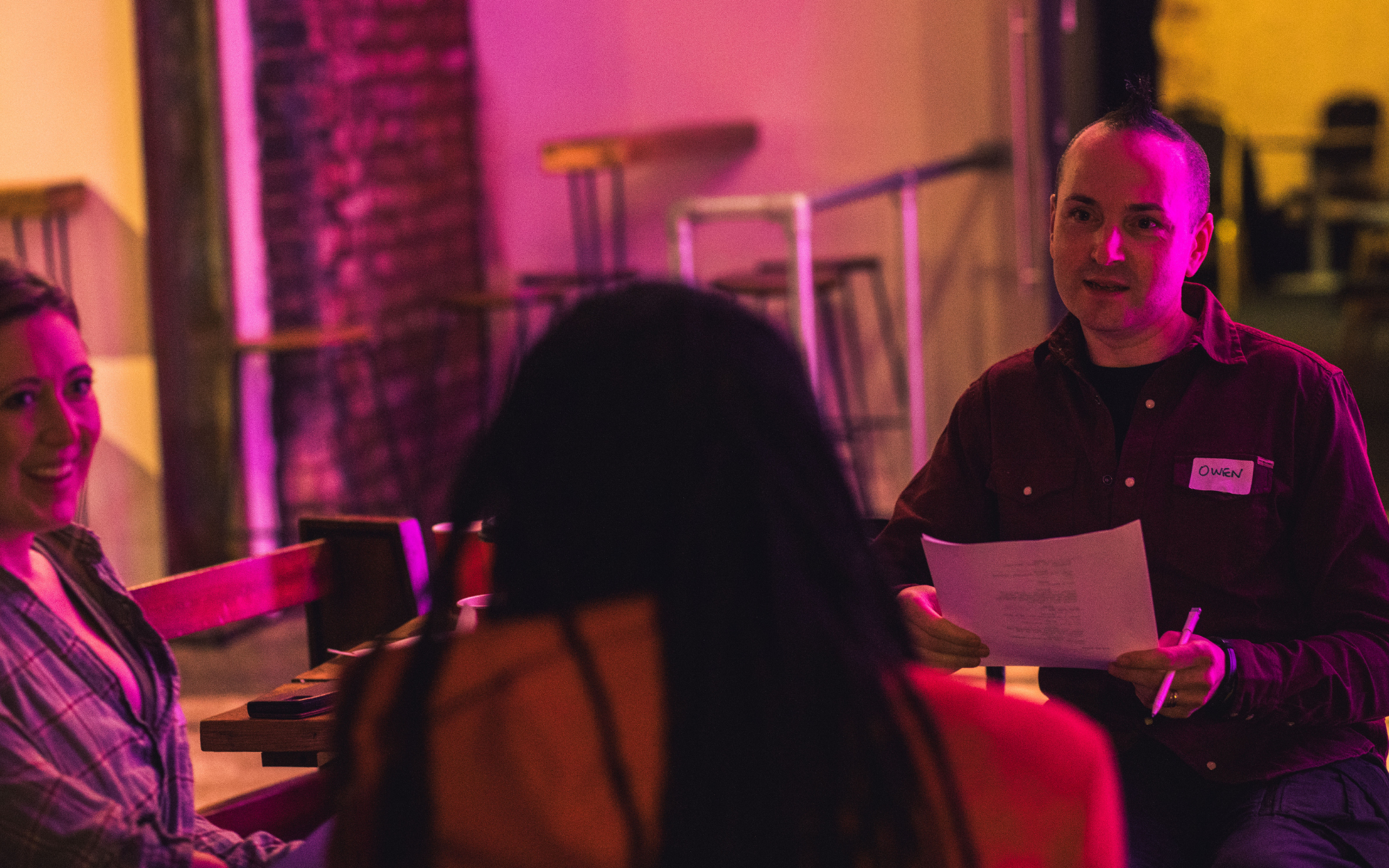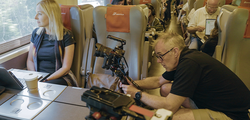Director Owen Tooth participated in Directors UK Inspire with his mentor, director Max Myers, and in our Directing Actors workshop. We caught up with him to discuss his experience on Inspire, and how it prepared him for directing his first episode of EastEnders.
Owen’s interest in directing began at a young age when he repaired an old broken camcorder and began filming. Since then, his short films have had successful festival runs all over the world. Wanting to break into continuing drama, he applied and was accepted onto Inspire and using that momentum, he recently added his name to the list of EastEnders directors.
When asked if he was nervous about directing this long-running beloved programme, he responded, “No, I find it comforting. There have been hundreds of directors, there is a structure to it and I’m just adding my part of the story.”
Read our conversation below.

Owen Tooth, photo credit RANKIN
What was it like to cross genres, from thrillers and documentaries to scripted TV? Did you feel like you were able to bring your creativity into a long running series?
I found it fun to work in a new genre. I quite like genre-hopping in my work, every genre has unique challenges. I watched a huge number of episodes to learn the camera language and rhythm of the edits and focused on fan favourite episodes to see what made them so special — which was usually the writing.
There’s a huge amount of creativity in directing a long running show, you need to make sure your block ‘feels’ like EastEnders, but you need to bring a lot to the table to make that happen. The foundational work — knowing the scripts inside out, knowing the characters, planning motivated blocking — is key. The hardest part is making sure your plans are achievable within the schedule and making sure you work smart so as not to be overwhelmed by the pace.

Directing Actors Workshop, photo credit Andrew AB Photography
You participated in our Directing Actors workshop last year; how did that help prepare you for this latest role on EastEnders?
It was a treat to be able to attend the Directing Actors workshop with Suri Krishnamma and DANC/Triple C. I live in Derbyshire, so having an event like this so close to home in Manchester was brilliant. The best bit about the workshop was getting to spend a day with two actors working on a scene and trying things out before sharing it with the group and exploring different ways of reaching an honest performance. It’s so rare to be able to hone that side of the skillset as a director and see how other director's work.
Being the first EastEnders director using a wheelchair is a significant moment. What are your reflections on this experience?
I feel so proud to have directed an episode, it’s a massive achievement.
Being the first wheelchair using director in the show’s 40-year history, it’s stupefying to know I’m now part of the history of EastEnders and disability in film and TV. It makes me both proud to have broken through against the odds, and also feel very positive for the future.
I know people in my situation have been shut out of this industry for over a century, with very, very few exceptions, so I feel like part of this is due to my drive, but a lot of it is down to the tireless work of forerunners and groups like: DDPTV (Deaf and Disabled People in TV) and DANC (Disabled Artists Networking Community), Jack Thorne’s campaigning for change in his famous McTaggart lecture, Channel 4’s Paralympics campaigns, the Diamond diversity report and Directors UK’s response to it, the BBC’s Elevate scheme, and some standout shows which have all gone to push change through.
“It’s been a rough ride to get this far, but the struggle I’ve had has nothing to do with a lack of ramps and everything to do with people’s perception of what someone in a wheelchair is capable of.”
The industry has been such a closed door to anyone with a disability that it’s been all but impossible to get to that level of experience and be considered for the show. It’s a sign that things are changing, that I was able to work my way through various productions and prove to the team here what I was capable of. It’s been a rough ride to get this far, but the struggle I’ve had has nothing to do with a lack of ramps and everything to do with people’s perception of what someone in a wheelchair is capable of.
When I work on a show there’s usually a feeling of being some kind of disability ambassador, I get so many questions from people saying they’ve never spoken to someone in a wheelchair before, often worrying about what language to use, and it’s an important part of making sure the door stays open for more people with disabilities to come through, to try to reduce that fear, but on EastEnders they’ve got a number of team members and actors who use wheelchairs so that groundwork had already been laid. It was brilliant to be able to hit the ground running with a team who were so comfortable around me.
Once I was invited onto EastEnders, it was a breath of fresh air, I was given the scripts and expected to get on with my work, just like every director before me.

Director Max Myers, Owen’s Inspire mentor
Do you have advice for anyone on Inspire about how to get the most out of working with their mentor?
The clearer you can be with your aims and what you need from your mentor, the more you can get from each meeting. I was excited just to be part of Inspire, but having a specific topic to discuss and being brutally honest with myself about where I needed to develop turned each meeting from what could have been a fun and aspirational chat, into one where I felt my skills as a director — and as someone able to navigate the industry— tangibly improve.
Max’s advice is the reason I have an agent today, and his advice is what kept me calm when prep began on my episode of EastEnders. He shared his technique for breaking down a script layer by layer and that helped me make sure I was the most prepared person on the set when the shoot began.
I like to have achieved something tangible before each meeting, to make sure that I’m listening and taking action — so I make sure we talk about things I can actually work on at this stage of my career. Having the next meeting in the diary really drives me to make sure I’m always moving forward.
Also, I’d say be realistic about what you expect: your mentor is there to offer you advice, not to open the door for you. Inspire is here to help you grow as a director.
As a cohort, we set up a WhatsApp group and it’s been so rewarding to see how well all the other directors in the cohort are doing, and I go to them for advice about plenty of things too. It’s the most supportive group I’m a part of.
What’s coming up next for you?
I’ve a number of exciting projects in the pipeline. My latest short, a comedy thriller, has just got into its 9th festival, with a BAFTA-qualifying screening and a BIFA-qualifier coming up! I’m meeting with a producer on another continuing drama, and I’ve a feature documentary I’ll be pitching shortly. I’m back at EastEnders in a few weeks for the dub, and hopefully I'll be able to pair that with a meeting with my mentor!







Have Your Say
Join the discussion on Facebook